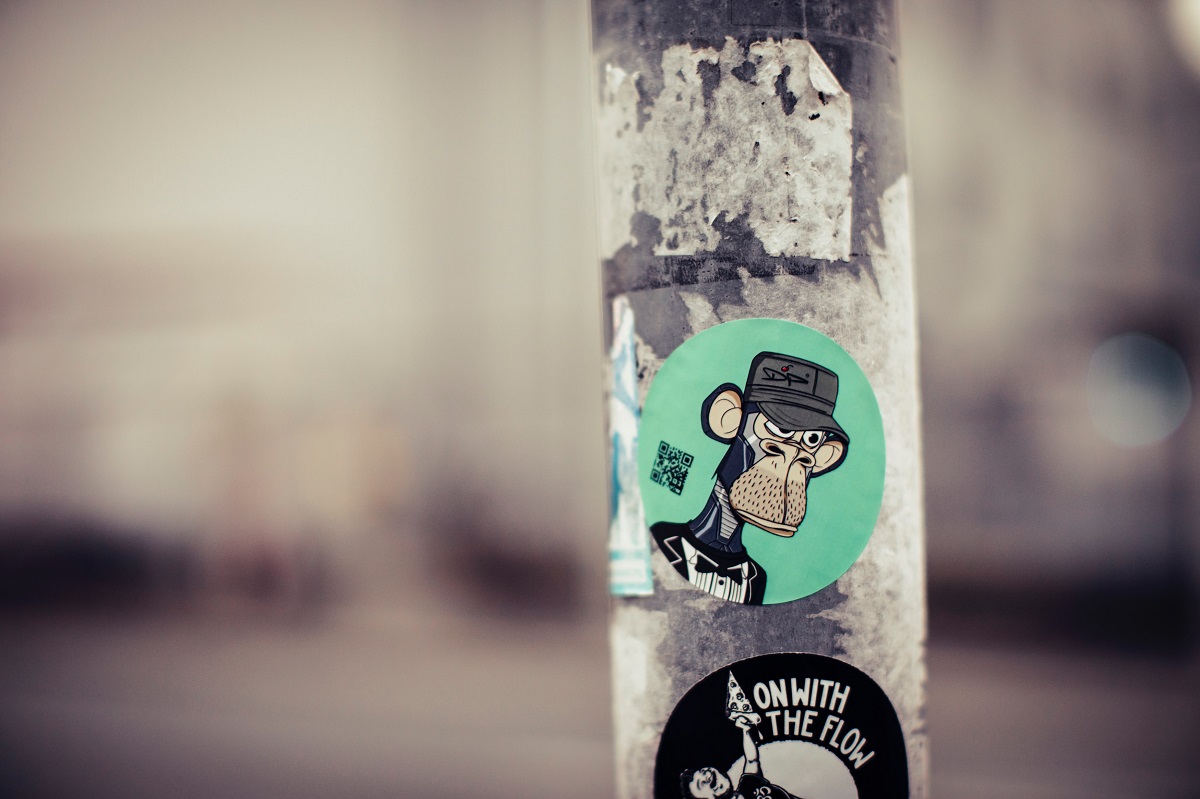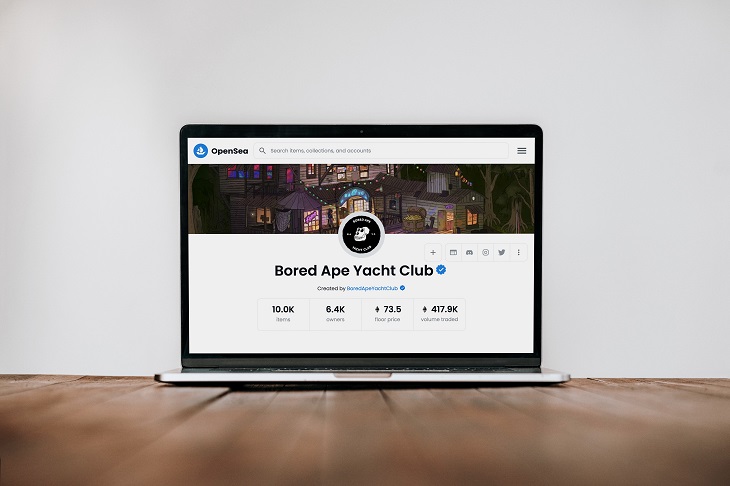Aped In: How BAYC Holders Are Cashing In Via Intellectual Property Rights

It’s hard to believe it’s been just over a year since Bored Ape Yacht Club (BAYC) went stratospheric. The collection is so famous that it’s become synonymous with the concept of NFTs themselves – when most people think of an NFT, they imagine a Bored Ape.
But what is BAYC?
The BAYC is a collection of 10,000 Bored Ape NFTs, some with in-built rarity (golden ape, anyone?). At its core, BAYC is a membership club – a “swamp club for apes”. Each ape is a key to a doorway to the BAYC for its lucky token holder.
BAYC embodies an aesthetic shift, but also a continuity – it’s punk gone digital. The coveted designs depict apes that are never really smiling. Some apes smoke or eat pizza nonchalantly, while others bear their grills, or are adorned in ripped leather jackets.
Pair the grungy artwork with a rapid mass celebrity buy-in – Snoop Dogg, Eminem, Madonna and Justin Bieber have all ‘aped in’ – and it somehow becomes a smidge less mind-blowing that people are queuing up to hand over hundreds of thousands of dollars in exchange for a slice of swamp-y pie.
Of course, it’s not actually about the cartoon ape, or any cartoon, really. BAYC – and NFTs themselves – are about much more than that. And with this particular exclusive club, lucrative opportunities await…
How BAYC Holders Are Cashing In Via Intellectual Property Rights
Some analysts initially branded the founders of the Bored Ape Yacht Club as simply lucky. While there may have been an element of “right time, right place” (isn’t there always!), we can look to a host of well calculated decisions made by Yuga Labs, the creators and founders of BAYC.
Because “flipping” BAYC NFTs – buying them low and then selling them high – isn’t the only way that those who have “aped in” can benefit from access to this exclusive ecosystem. If you have an ape, you can profit from BAYC’s intellectual property (IP).
So what does this mean? Is Bored Ape copyrighted?

Well, those who hold apes have full commercial rights over their token, without any sort of financial cap. Normally, NFT licenses limit IP revenue to $100,000 a year. But with BAYC, the sky is truly the limit.
Everybody with an ape can profit from the use of BAYC’s IP. BAYC gives holders of its original 10,000 NFTs full commercial rights over their tokens, with no monetary cap. This means that, in stark contrast to other NFT licenses, BAYC IP rights are unlimited. Members can take full advantage of the lucrative IP they own.
There’s one crucial point here, though: Yuga Labs doesn’t allow use of Bored Ape’s “name, logos or branding” in holders’ commercial ventures. So, you can exploit your ape, but not Bored Ape themselves.
We’ve been on a mission to find the innovative ways that creators are integrating their apes with other businesses – often to lucrative ends.
Aping in with music videos
Monkey business? More like the future of the music business… The industry has welcomed some new main characters of late, with Bored Ape #9797 the first of the crew to drop a BAYC music video last December.
The video, which features a bunch of apes aboard a yacht, is for a song titled for those in the know. Delist Your Ape (2DaMoon) features songwriter and hip hop artist Reo Cragun, as well as Clear Eyes (Jeremy Lloyd from the electronic duo Marian Hill).
Last November, Universal Music Group signed its first virtual band made up of four Bored Apes, owned by Jimmy Mcnelis. Since then, UMG has built out the Kingship brand, even buying another bored Ape NFT at $350,000 to “manage” the band.
Kingship’s first NFT collection, which unlocks entry into the (still in-construction) Kingship virtual world, sold out last month – netting the label a cool $1.43 million from the primary sale. And this looks to be just the beginning: there’s currently an NFT from the Kingship collection listed on OpenSea with a price tag of 999 ETH. Phew.
While Web 3.0 music labels are milking their apes with stratospheric success, already successful artists – including Post Malone and Timbaland – are also betting big on ape investment. Both artists intend to utilize their tokens for immersive music performances, videos, and appearances.
Aping in with food ventures
Where there are burgers, there will be apes. That’s according to Food Fighters Universe, anyway. The team is speaking the most universal of all love languages, and appealing to our stomachs – wise move, we’d say.
The first of a number of BAYC-inspired foodie endeavors was Bored and Hungry, a Long Beach-based burger joint decorated with four Apes, which gives customers the opportunity to pay in cryptocurrency and also has plans to install a bitcoin ATM.
“The reason I did this was to make a statement to the public, letting them know that [BAYC NFTs] could be utilized to turn into a brand and ecosystem for the restaurant world,” Food Fighters co-founder, Andy Nguyen, told Hypebeast in March.
If Nguyen hoped to demonstrate how the marketing potential of BAYC NFTs could translate into real world ventures, he hit the mark with Bored and Hungry. Food Fighters is already set to branch out with a variety of different BAYC-inspired foodie endeavors – with some serious A-list collaborators to boot.
Those of us with a sweet tooth are licking our lips in anticipation of the launch of another Food Fighters project, Dr. Bombay’s Sweet Exploration, which will feature Snoop Dogg’s personal BAYC NFT (#6723) and offer an immersive retail dessert experience. (Disclaimer: we’re not 100% sure what that means, but if it features Snoop Dogg, Web 3.0, and top-tier tasty desserts – we’re sold.)

Aping in with books
Introducing Bored and Dangerous – the first piece of community-written, Web 3.0 literature.
The book is a community-created story featuring the adventures of Jenkins the Valet – an ape who created himself an immersive backstory, and then roped in the community to help write the fantasy tale.
Famed writer Neil Strauss got involved, and a writers’ room was created. Through clever use of NFTs within the BAYC ecosystem, Apes could purchase the right to enter the “Writers’ Room 2.0″. Apes with top-tier “yacht” NFTs had the opportunity to be characters in the book, while the Writers’ Room NFT gave contributors voting privileges, letting them help shape the story’s narrative.
In all, 3,000 members of the Writers’ Room banded together to craft plot and tone. Meanwhile, 4,075 Apes/Mutants licensed their IP to appear in the work. Each of those licensors will receive royalties, with 50% of net profits flowing back to licensors.
Did we just glimpse the future of equitable, immersive publishing? Maybe so!
Featured image by Markus Spiske on Unsplash
Tags: Bored Ape, Bored Ape Yacht Club, Cryptocurrency, Investment, Money, NFT, NFT Trading
